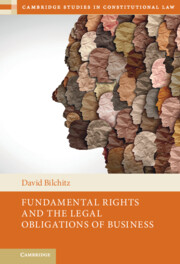Book contents
- Fundamental Rights and the Legal Obligations of Business
- Cambridge Studies in Constitutional Law
- Fundamental Rights and the Legal Obligations of Business
- Copyright page
- Dedication
- Contents
- Figures
- Tables
- Preface
- Acknowledgements
- Table of Cases
- Introduction The Question of Substantive Corporate Obligations for Fundamental Rights
- 1 The Nature and Purpose of the Corporation in Law
- Part I Legal Doctrinal Models for Addressing the Substantive Obligations of Non-State Actors for Fundamental Rights
- Part II Towards a Multi-Factoral Approach for Determining the Substantive Content of Corporate Obligations
- Part III The Institutional Implications of the Multi-Factoral Approach
- 9 Embedding the Multi-Factoral Approach in Corporations: The Role of Corporate Law
- 10 Corporate Obligations in a Global World: The Role of International Mechanisms
- Bibliography
- Index
9 - Embedding the Multi-Factoral Approach in Corporations: The Role of Corporate Law
from Part III - The Institutional Implications of the Multi-Factoral Approach
Published online by Cambridge University Press: 29 October 2021
- Fundamental Rights and the Legal Obligations of Business
- Cambridge Studies in Constitutional Law
- Fundamental Rights and the Legal Obligations of Business
- Copyright page
- Dedication
- Contents
- Figures
- Tables
- Preface
- Acknowledgements
- Table of Cases
- Introduction The Question of Substantive Corporate Obligations for Fundamental Rights
- 1 The Nature and Purpose of the Corporation in Law
- Part I Legal Doctrinal Models for Addressing the Substantive Obligations of Non-State Actors for Fundamental Rights
- Part II Towards a Multi-Factoral Approach for Determining the Substantive Content of Corporate Obligations
- Part III The Institutional Implications of the Multi-Factoral Approach
- 9 Embedding the Multi-Factoral Approach in Corporations: The Role of Corporate Law
- 10 Corporate Obligations in a Global World: The Role of International Mechanisms
- Bibliography
- Index
Summary
This chapter considers the institutional implications of the multi-factoral model in national law. Given its involving an ineliminable need for judgment, this chapter argues for an approach to law reform that focuses on enhancing the quality of decision-making within the corporation surrounding its fundamental rights obligations. Doing so, I argue requires focusing much attention on reforms to corporate law that can help ‘constitutionalise’ fundamental rights within the basic legal structure of the corporation itself. I propose a series of law reforms that include expanding the diversity of the directors; developing a new fiduciary duty specifically relating to fundamental rights; enhancing disclosure requirements; developing a new enforcement action allowing directors to be sued in their personal capacity for rights violations; creating regulatory fines and financial penalties for rights violations; implementing an enhanced framework for shareholder obligations; rejecting the business judgment rule where fundamental rights are involved; and the utilisation of dialogical remedies by courts.
Keywords
- Type
- Chapter
- Information
- Fundamental Rights and the Legal Obligations of Business , pp. 361 - 412Publisher: Cambridge University PressPrint publication year: 2021

